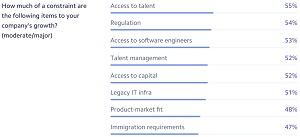News
Study Says Enterprise Misuse of Developers Costs Billions
- By David Ramel
- September 10, 2018
A new survey says organizations are leveraging developer talent in the wrong way, finding that "lost productivity" resulting from tasks such as debugging and code maintenance wastes $85 billion globally in "opportunity cost" every year.
The new survey -- "The Developer Coefficient" -- was sponsored by Stripe, known for a payments processing platform, which put Harris Poll to work, surveying C-level executives and developers across more than 30 industries to explore how enterprises are using developer talent and what they could be doing differently to reap myriad benefits and save billions of dollars.
According to the study, enterprises are no longer held back by lack of capital resulting from the global financial crisis that occurred some 10 years ago, but rather by how they deploy their best coders. While study after study has illustrated the dearth of top-notch developer expertise, the new study takes that notion even further, saying "high-quality software engineers are now becoming the world’s most precious resource."
Furthermore, as developers have become potent force multipliers who can make or break a business, the access to skilled talent overrides all other concerns, including access to capital, immigration concerns and so on.
One major highlight of the study points to the misuse of high-priced talent for the more mundane developer tasks. "The average developer spends more than 17 hours a week dealing with maintenance issues, such as debugging and refactoring," the survey report said. "In addition, they spend approximately four hours a week on 'bad code,' which equates to nearly $85 billion worldwide in opportunity cost lost annually."
 [Click on image for larger view.]
Growth Constraints (source: Stripe)
[Click on image for larger view.]
Growth Constraints (source: Stripe)
That price tag goes up even further when taking into account other factors. Citing its own and additional data from Evans Data Corp. and CIA Factbook, Stripe claims some $300 billion in GDP is lost annually because of developer inefficiency.
"Senior executives believe that the lack of quality developer talent is one of the biggest potential threats to their growth," Stripe said. "Yet even though demand for high-quality software engineers is at an all-time high, they aren’t being deployed toward the most impactful projects that move businesses forward."
Some highlights of the survey include:
- Among more than 1,000 C-level executives surveyed, access to talent (55 percent) was cited as a constraint to their company's growth, with access to software engineers (53 percent) cited more often than access to capital (52 percent).
- In an average 41.1-hour developer work week, 13.5 hours is devoted to addressing technical debt, while 3.8 hours is spent fixing bad code.
- The majority of respondents (59 percent) agreed that “The amount of time developers at my company spend on bad code is excessive.”
- Artificial intelligence (AI) was the No. 1 technology trend listed by both developers and executives as having the most impact on their companies today and in 10 years, followed by Internet of Things (IoT).
- Despite the aforementioned problems with the correct use of high-quality software engineers, the majority of executives and developers both agree their companies have sufficient resources to respond to the above trends and keep up with the trends.
- Of those who don't feel they have the sufficient engineering resources to keep up with the above technology trends, the biggest plurality (44 percent) cited "we're too slow to react to tech trends," followed by "we don't have enough skilled employees" (42 percent) and "leadership doesn't prioritize technology" (36 percent).
"While businesses today face myriad issues -- security vulnerabilities, trade tariffs, complex government regulations, increased global competition -- how they deploy their developers may be the single-biggest factor impacting their future success," Stripe said. "Developers act as force-multipliers, and if used effectively, have the collective potential to raise global GDP by $3 trillion over the next 10 years."
Furthermore, the company concluded, "... businesses need to better leverage their existing software engineering talent if they want to move faster, build new products, and tap into new and emerging trends." No specific steps to accomplish that were provided.
Stripe said More than 1,000 developers and more than 1,000 C-level executives in the United States, U.K., France, Germany and Singapore participated in the study.
About the Author
David Ramel is an editor and writer at Converge 360.